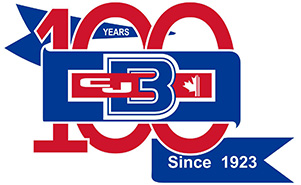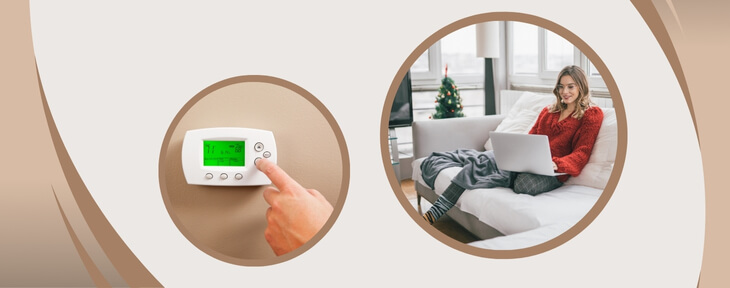When the temperatures start to drop, the importance of having a properly functioning furnace becomes apparent. However, a malfunctioning heater can not only put a damper on the comfort of your home but can also become a safety hazard if left unchecked. If you’re wondering “How much does furnace repair cost?” or you’ve been searching for “furnace repair near me,” then you’ve come to the right place.
In this article, our experts from CJ Brubacher discuss the best practices for ensuring that the heater in your home or business stays in top working condition. We’ll explore everything from common issues that can lead to breakdowns and their costs to solutions that can prevent breakdowns and minimize their effects. By the end of this article, you’ll be equipped with all the knowledge you need to make informed decisions about your repair needs.
Signs That Your Furnace Needs Attention
Heaters quietly serve a crucial role in our homes, often unnoticed until it’s too cold and you turn up the thermostat to get no response. So let’s get to it: how can you tell when your heater needs some TLC? Here’s a couple of things to keep an eye (and nose) out for:
- Increased energy bills: Are your heating costs going through the roof? An unusually high heating bill might indicate that your HVAC system is running less efficiently than it should.
- Odd noises: Unusual sounds coming from your heater, such as popping, humming, or screeching, could mean that a component of your HVAC system needs repair or replacement.
- An unusual smell: A furnace in good condition should not produce any odours. If you’re noticing a persistent gas smell, call a professional right away as it might be a gas leak.
- Constant cycling: If your heat repeatedly turns off and then back on, it could be a sign of improper ventilation, a clogged filter, or a wrong-sized furnace for your home.
- Poor indoor air quality: Notice an increase in dust or dry air in your home? The furnace might be contributing to it, indicating it’s time for a check-up.
These signs may indicate a problem with your HVAC. However, they may also be symptoms of other issues in your home’s heating system. Therefore, it is essential to have an expert diagnose the problem. Regular maintenance and timely repair can prevent these issues, ensuring the longevity and efficient operation of your furnace.
Understanding Your Furnace: Preventative Maintenance
Just as you would with your car, think of your heater as an investment that needs periodic servicing to keep it running well. And just like your vehicle, a well-maintained HVAC can serve you well beyond its expected lifespan. Let’s have a look at some preventative maintenance steps you can take:
- Regular filter changes: This is the easiest and perhaps most effective thing you can do to prevent the most common problems. For most households, filters should be replaced every three months. Pro tip: Mark the date of replacement on the side of the filter as a reminder!
- Regular inspections: We recommend at least one professional inspection per year. This can often catch issues before they lead to a full system breakdown.
- Tune-ups: Tuning up your heater can improve its efficiency and longevity. While you can do some minor tune-ups yourself, a professional can perform a comprehensive tune-up that includes cleaning and testing all parts of your heating system.
No one wants to be left in the cold, so remember these simple maintenance steps, and don’t wait until it’s too late. When it comes to your heating system, an ounce of prevention is truly worth a pound of cure!
Efficient Thermostat Usage for Optimal Furnace Performance
Using your thermostat properly can significantly enhance the efficiency of your heater and the overall comfort of your home. The right settings can result in lower energy bills, better temperature management, and extended furnace life.
How to Use Your Thermostat Efficiently
Here are several tips you may want to consider:
- Set and Forget: Choose a comfortable temperature for your home and then leave your thermostat alone. Constantly adjusting the temperature can cause your HVAC system to work more, adding to the wear and tear, and increasing your energy bills.
- Utilize a Programmable Thermostat: These high-tech marvels let you set precise temperatures for different times of the day. For instance, you can set the thermostat to lower the temperature when you’re at work or asleep, and then heat the house just before you wake or get home. You’ll stay comfortable and save money at the same time.
- Regular Maintenance: Like your furnace, your thermostat also requires regular check-ups. Keep it dust-free and ensure it’s properly calibrated during your annual HVAC inspection to dodge unnecessary complications.

Optimal Thermostat Setting for Winter
The optimal setting on your thermostat during the winter largely depends on your personal comfort and the energy efficiency you wish to achieve. However, as general guidance, the U.S. Department of Energy recommends setting your thermostat to 68°F (20°C) when you’re at home and awake, and lowering it when you’re asleep or away. This best practice can help you save up to 10% a year on your heating bills.
Ensuring Proper Airflow in Your HVAC System
Having proper airflow in your HVAC system is vital. It ensures the right amount of air reaches your furnace, allowing it to work effectively and efficiently. Good airflow helps promote energy efficiency, enhancing your comfort, and extending its lifespan. Conversely, poor airflow can lead to several issues, such as uneven room temperatures, rapid cycling of the system, and excessive wear and tear, to name a few.
Practices to Ensure Proper Airflow
Here are a few tips to help you maintain proper airflow in your HVAC system:
Regularly Replace or Clean Your Air Filters: One of the most common reasons for restricted airflow is dirty or clogged filters. Air filters trap dust, debris, and allergens, ensuring clean air circulation within your home. Over time, these filters can become clogged, restricting the flow of air. It’s recommended to check your filters once a month and replace them if necessary. A clean air filter not only ensures proper airflow but also improves air quality and the efficiency of your heater.
Keep Vents and Ducts Clean and Unblocked: Dust and debris can accumulate in your ductwork over time, hindering the movement of air. Regular cleaning of the ducts helps in maintaining optimal airflow. Likewise, ensure that the intake and exhaust vents outside your home are not blocked by leaves, snow, or other obstructions.
Maintain Regular Maintenance: Regular professional maintenance is integral to the performance and lifespan of your HVAC system. Trained professionals have the right tools and expertise to detect and rectify any potential issues. This not only ensures proper airflow but also keeps your heat running efficiently.
Scheduling Your HVAC Maintenance
“An ounce of prevention is worth a pound of cure.” This adage rings especially true when it comes to your HVAC system. Scheduling regular inspections and maintenance with a trusted professional can help prevent any serious problems before they occur. Ideally, it’s best to have your system checked in the fall before you start using it heavily in the winter. However, if you notice any signs of malfunction, do not hesitate to get an inspection done immediately to avoid more major issues or a complete system failure.
Remember, taking care of your HVAC and ensuring proper airflow will not only enhance efficiency and extend lifespan the of your system but will also provide you the utmost comfort during the chilling winter months.
Service and Repair with CJ Brubacher
Don’t take a chance with your comfort this winter season. Call CJ Brubacher today! Our certified technicians are standing by to ensure your furnace provides reliable, efficient heat when you need it most. Why wait until a small inconvenience becomes a major problem? Let us provide the peace of mind that only comes with exceptional furnace repair service. Dial our number now and let’s guarantee your cozy indoors, all winter long. Your heater deserves the gold-standard treatment, and so do you. Contact us today!

